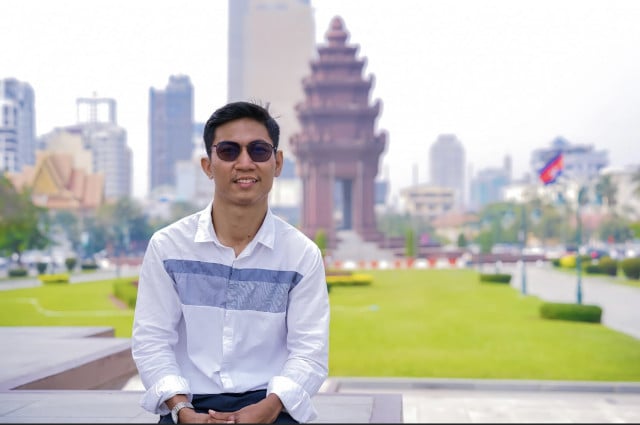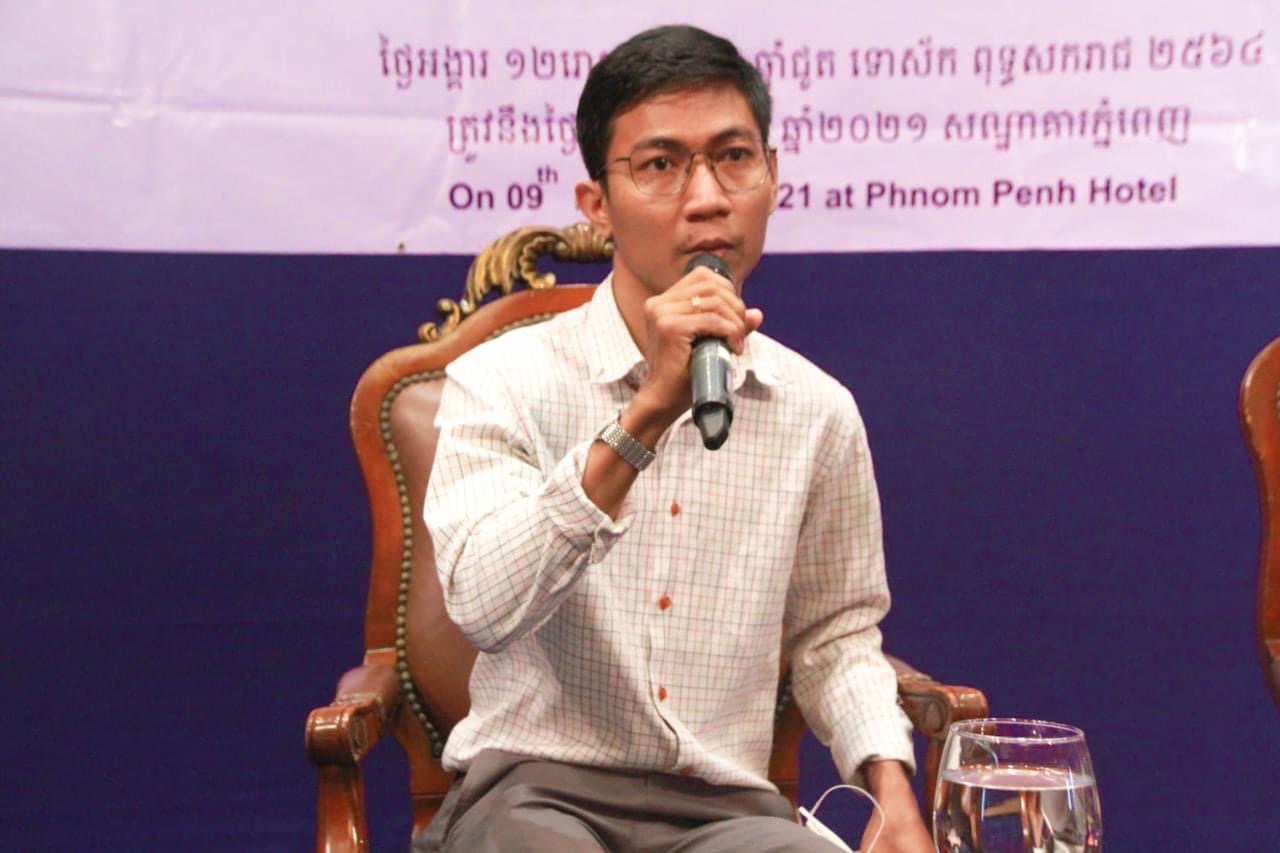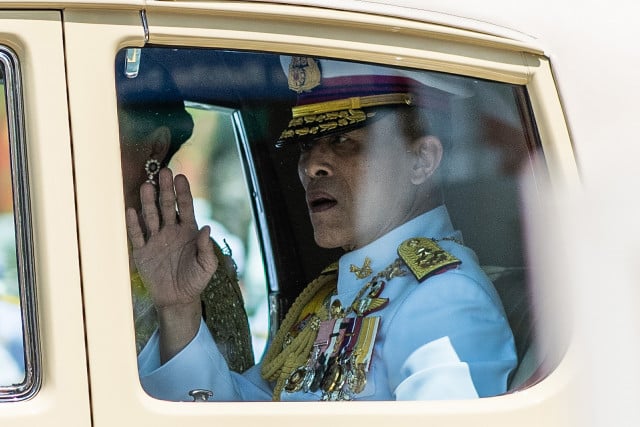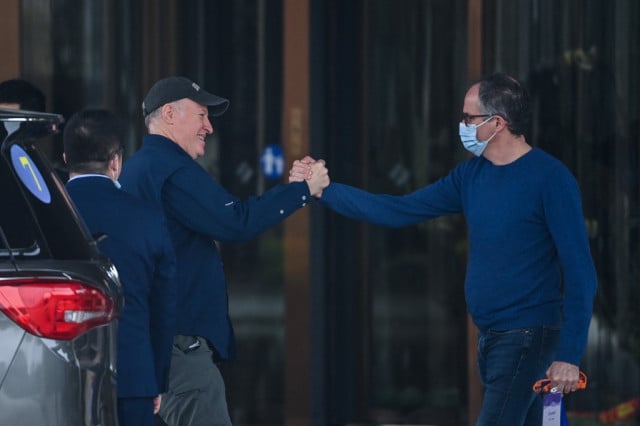Physically Disabled People Aiming for Higher Education: Don’t let Fear Stop You, Pornd Raksmey Says

- By Teng Yalirozy
- September 6, 2021 12:09 PM
Born and raised in Takeo Province, Pornd Raksmey is suffering from cerebral palsy—a disorder that affects a person's ability to move and maintain balance and posture. Despite this disability, Raksmey graduated in 2017 with a bachelor's degree in social work at the Saint Paul Institute in Takeo Province. That same year, he also took part in a two-week exchange program in Australia. Raksmey first taught at a private English-language school in his province. He is now a project assistant for communications and advocacy at the United Nations Development Programme (UNDP). He spoke of his journey as a person with a disability to obtain a university degree.
Teng Yalirozy: What inspired you to pursue higher education?
Pornd Raksmey: I have always valued and loved education since I was young. I believed that only education could change my life. I had to struggle in my life from an early age. Therefore, I firmly believed that education could provide me with a better job when I grew up so that I could support myself as well as my family. Moreover, I have always noticed that people with disabilities in my hometown usually do not get enough education due to their life struggle. Seeing that prompted me to study hard and at least get a bachelor’s degree.
Teng Yalirozy: What are the challenges you met during your journey to get where you are now?
Pornd Raksmey: My first challenge was a livelihood issue. I did not have enough money to support my getting an education, which put an end to my hope of pursuing a bachelor’s degree in Phnom Penh. Although I was offered scholarships at universities in Phnom Penh, I was not able to cover my daily expenses for commuting, rent and meals. So, I decided to pursue a bachelor’s degree in my province. One more thing is that I had difficulty with traveling. I could not travel long distances as I did not have a motorcycle for the disabled yet. I usually rode with my friends to school, which was somehow difficult for me, always having to depend on others. Moreover, it was hard for me to climb up the stairs to go to class. At the time, I wished the school had set the classes for me and the other disabled students on the ground floor. What I found most challenging was the comments from people around me. My neighbors told my parents they should not have let me study because I would not be able to get a job due to my disability.
Teng Yalirozy: What do you think is the main barrier for disabled people to pursue higher education?
Pornd Raksmey: Disabled people cannot learn unless they get support in terms of money and emotions.…[They] still need help with their daily expenses even though they are offered free education at universities because they still have to pay the administrative fees. Secondly, the obstacle is the lack of emotional support as they are always bullied and discriminated against. Therefore, if they have weak mental health, they will not be able to continue their education. Moreover, disabled people mostly do not get the chance to travel…due to their disabilities, which makes them lack a broad vision of the world. This factor can affect their decisions and judgment. Furthermore, in rural areas, the schools are far, which makes it hard for disabled kids to go to school. And finally, disabled people are still suffering from being labelled because they are always viewed as people with inabilities. They are always stereotyped, that they will not get a job after graduation. This is still a problem, which can hinder their willingness to pursue an education.
Teng Yalirozy: Do you think disabled people play an important role in the education sector? In what way?
Pornd Raksmey: Yes, they are really important in the education sector. When disabled people get involved in the sector, they can effect a positive change for other disabled people because they will know what is needed to help people with disabilities to get an education. Disabled people can suggest solutions to assist other disabled people. At least, they can improve [matters] and be a support for other disabled people. Moreover, I have seen that the extra learning tools for disabled people are still in short supply, so disabled people working in the education sector can help with that by seeking more tools.
Teng Yalirozy: What was your achievement or memory that is the most meaningful to you?
Pornd Raksmey: I can say I have managed several achievements, but the most meaningful one to me is winning a lawn bowls game. I was ecstatic because I was competing against people with no disability. I won over them. The second one must be joining an exchange program in Australia. It was my first time leaving Cambodia. I was happy because I was able to prove wrong those who say that disabled people never go far. Moreover, I was offered a job, which I love, at UNDP. Although these may not seem like major achievements to some people, I am proud of myself.
Teng Yalirozy: What advice or encouragement do you have for disabled people who want to pursue higher education or are struggling right now?
Pornd Raksmey: I encourage them to keep trying hard and never give up. Moreover, I believe that along the journey of pursuing education lies many obstacles, which I cannot stress enough. So, I encourage them to be perseverant and face those obstacles with no fear. I know it is not easy, but it shall pass with endurance and passion. One day, they will be successful. I was not immediately offered a job at UNDP; I was lonely, roaming Phnom Penh for jobs. But eventually, I was able to make it. And, do not let fear stop you from doing what you wish and believe in.
















